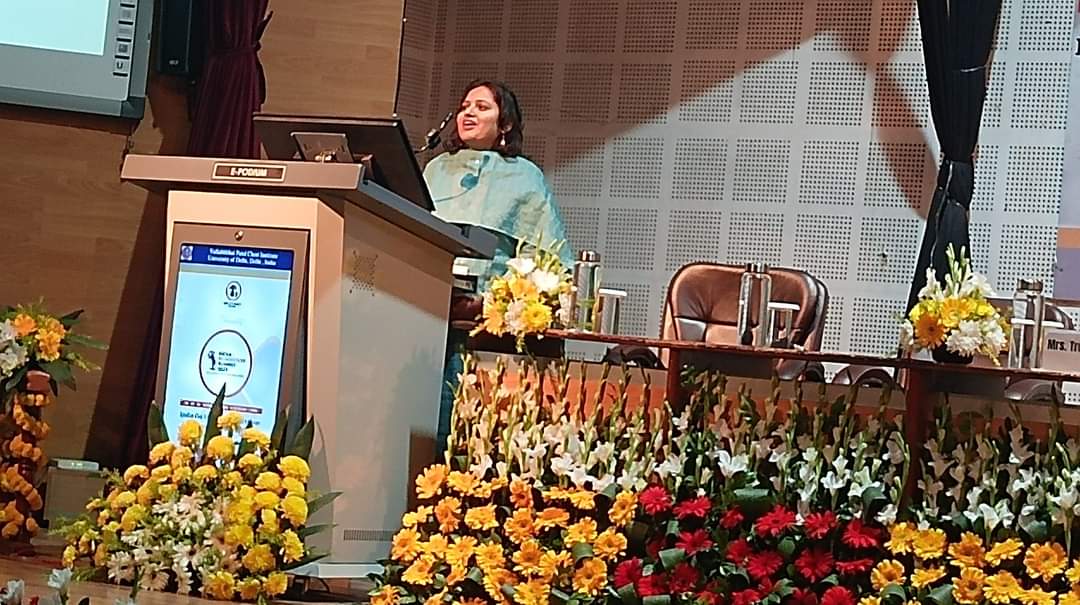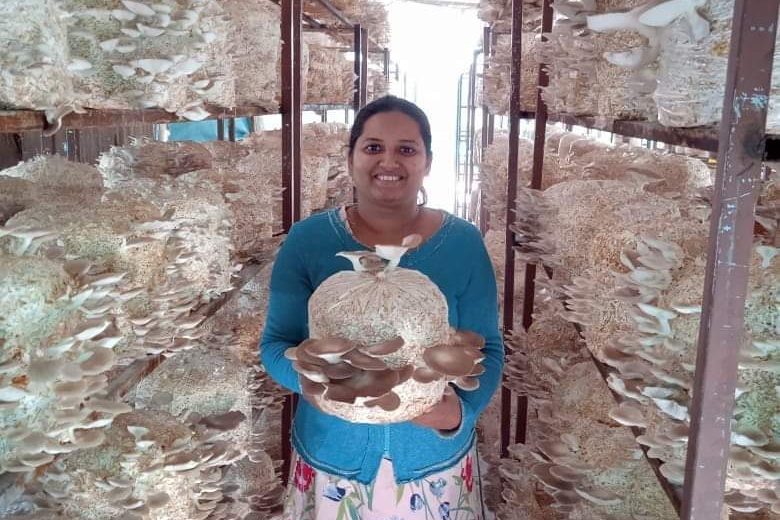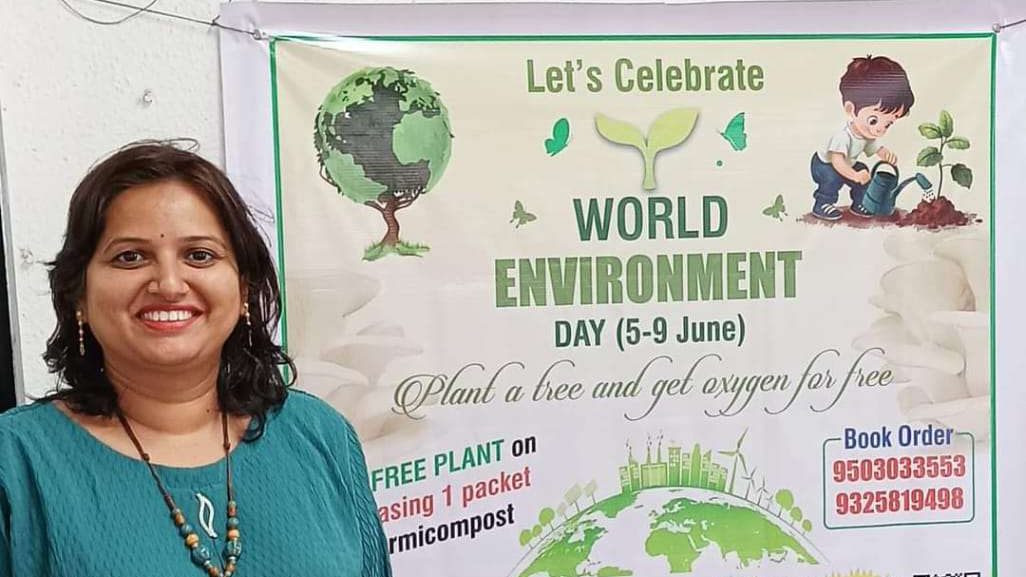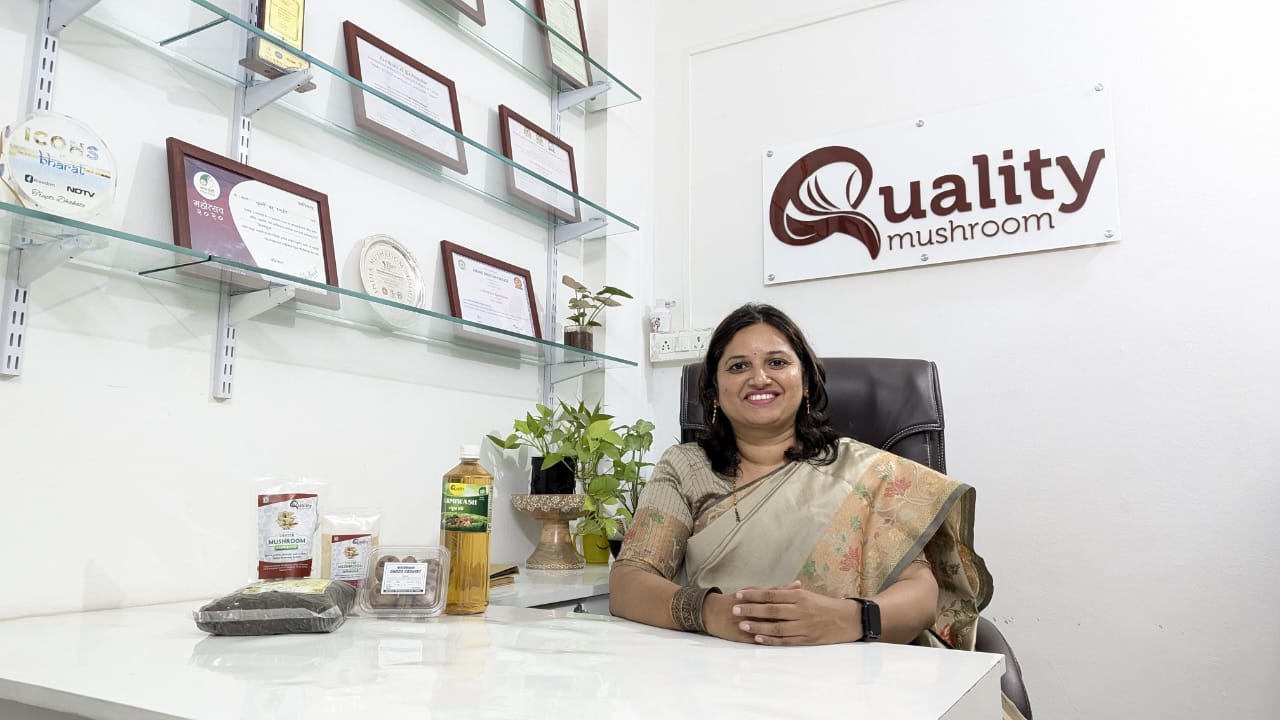Trupti Dhakate, a former microbiology professor, has traded her lab coat for a farmer’s hat. Her journey from the world of academia to mushroom farming is an inspiring tale of what happens when one, against all odds, follows their passion. Through her company, ‘Quality Mushroom Farm’, she is not only changing the lives of farmers across the country but also addressing pressing environmental issues.
Having frequently seen news reports about the harmful effects of burning farming waste — both in terms of air pollution and its impact on farmers and surrounding communities — Trupti was deeply moved. “I thought, why not use this waste to grow something beneficial, like mushrooms? Not only would it reduce pollution, but it would also offer farmers a way to grow something nutritious,” she tells The Better India. However, turning her passion into a business was no easy feat.
From research to entrepreneurship
Trupti’s road to success was filled with challenges, both personal and professional. Initially, her family was sceptical about her leap into the unknown world of mushroom farming. The stability and prestige of her academic career, spanning over five years of teaching and conducting research at Nagpur University, seemed like a safer path. Starting a business with uncertain returns, particularly in a relatively underdeveloped mushroom market in India, seemed like a risky proposition.

Despite these doubts, Trupti’s passion for mushrooms kept her going. “I had done so much research, studied so much about it, that I just couldn’t let go of the idea,” she shares.
Mushrooms, which are rich in protein, vitamins, and minerals, had the potential to contribute significantly to the health of local communities too. What made it even more exciting was the possibility of growing mushrooms in small, confined spaces — a perfect solution for women and families living in urban areas with limited access to land. Trupti began seeing a business opportunity not just for herself, but for others in her community.
With unwavering determination, she convinced her husband to invest a sum of Rs 3 lakh in the business. This investment laid the groundwork for Quality Mushroom Farm. “Some years ago, my mother was diagnosed with breast cancer. We had read somewhere that mushrooms are helpful for people suffering from breast and prostate cancer. So, when Trupti wanted to take this up as a full time job, it really spoke to me,” shares Bhushan Dhakate, Trupti’s husband.
Overcoming obstacles for a sustainable future
When she finally launched her business in 2018 after years of research, Trupti’s primary challenge became educating the public about mushrooms, particularly oyster mushrooms.
“We had to educate people about the nutritional value of mushrooms and clear up misconceptions about them being a non-vegetarian food. I even started cooking dishes with mushrooms as the main ingredient. We went to the local markets, set up tasting stations, and handed out free samples. It was a lot of work, but slowly people began to accept it,” Trupti recalls.

This method of engaging with customers — hands-on, personal, and educational — proved to be effective. Her husband, who was also involved in the business, would assist on weekends, visiting markets and setting up mushroom stalls. Slowly, word of mouth spread, and people began embracing mushrooms as a valuable and nutritious addition to their diets.
“We were told early on to export all the good quality mushrooms that were being grown. But Trupti is adamant that not all good produce needs to be sent out. People in our own country need it, so we wanted to provide for them first and foremost,” shares Bhushan.
In 2020, as the world grappled with the COVID-19 pandemic, Trupti’s business faced another hurdle: lockdowns and market closures. With the traditional supply chain disrupted, she had to pivot quickly to keep her business running. Drawing on her scientific background, she began experimenting with value-added mushroom products — mushroom cookies, garlic bread, khakhra, papad, cupcakes, and even marble cakes. They started home deliveries to keep the momentum going.

“People saw the pictures of these products online, and it really piqued their interest. During the pandemic, people were looking for plant-based sources of protein, and mushrooms were the perfect fit. This was the moment when people began realising the importance of incorporating mushrooms into their diet,” she says.
This shift toward value-added products not only allowed her to keep her business afloat during the pandemic but also expanded her customer base. The demand for protein-rich, vegetarian food was on the rise, and Trupti’s mushroom-based products filled that need.
The success of the new products also paved the way for more collaborations with local farmers, helping them transition to organic and sustainable farming practices.
Empowering over 7,000 students, 200+ farmers
One of the key aspects of Trupti’s mission is empowering others, particularly women and small-scale farmers, to embrace sustainable farming practices. Through her workshops and training sessions, she has educated over 7,124 students and has helped more than 200 farmers start their own mushroom cultivation businesses.
Her training programmes focus on various aspects of mushroom farming, including commercial production, infrastructure, and the practicalities of growing mushrooms using organic methods. She also emphasises the importance of vermicomposting — a technique she has successfully incorporated into her farm to recycle waste products into natural fertilisers and pesticides.

“What I really care about is helping farmers shift towards natural, organic farming,” she says. “There are so many health issues associated with the use of chemical pesticides, not just for consumers but also for farm labourers who are regularly exposed to them. Natural farming is better for everyone — the soil, the crops, and the people.”
By offering hands-on training and real-world applications, Trupti has built a community of farmers who are learning to grow high-quality, organic mushrooms, thereby contributing to both their economic independence and the health of their communities.
‘Everyone deserves good food’
Trupti’s commitment to quality and sustainability has paid off. From struggling to find a market for her mushrooms to building a brand that now serves customers across India, her perseverance has turned her vision into a thriving business.
“The first three years were all about setting up, learning, and experimenting,” she says. “I knew how to teach, but I didn’t know how to market. I didn’t have any formal business training, so I had to learn everything on the go — from packaging to distribution.” Through sheer dedication, Trupti has not only established a successful mushroom farm but also helped shift the mindset around sustainable agriculture.
Today, Quality Mushroom Farm offers wholesale mushroom supplies and home delivery across India. She also continues to expand her research into new varieties of mushrooms, including shiitake and semechi mushrooms, and is working toward setting up a research lab to continue her studies.

Her long-term vision is to teach more farmers about sustainable and organic farming techniques, while ensuring that high-quality, nutritious food is accessible to all. “I want people to start farming quality products sustainably because everyone deserves good food,” she emphasises.
“I believe in collaboration,” she explains. “When we collaborate, we all win. The demand is there, and if production can keep up with it, the industry will thrive as a whole. I want to create a platform where everyone benefits — from the farmers to the consumers.”
When asked how she managed to balance her personal life with running a business, Trupti laughs, “I really don’t know where all that energy came from. I look back and can’t believe I pulled it off!” From running a farm, doing deliveries, managing a home, and even packing her children’s school lunch, Trupti embodies the spirit of a woman who truly does it all.
Edited by Arunava Banerjee, All Images Courtesy Trupti Dhakate
No comments:
Post a Comment